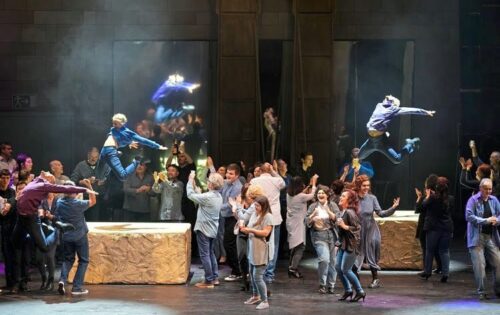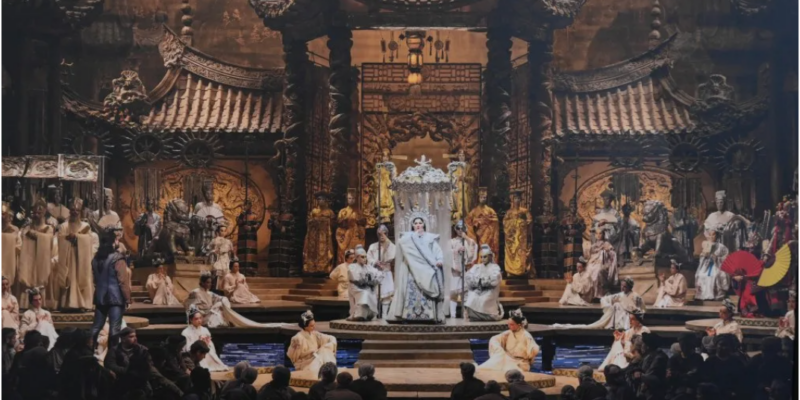
Are we addicted now ?
Trying to respect the libretto
In the final scene of Falstaff, Ford says, “Chi schivare non può la propria noia, l’accetti di buon grado” (“He who cannot avoid his own boredom should accept it willingly”). This is the attitude of many opera lovers when faced with dystopian and alienating “innovative directions.” Even without concrete statistical data, it is clear that the number of those who are not resigned to what they consider to be an obscure decline is constantly decreasing. On the other hand, there is an increase in enthusiastic reviews that praise the creativity and originality of the “post-modern” directorial choices and that equally dismiss as antiquated and banal the stagings that try to respect the libretto and the related instructions. Such enthusiasm raises serious questions. Could it be that the reviewers truly appreciate the grotesque absurdities of the “regietheater”? Is it possible that the increasingly insistent revival of stagings that have little or nothing to do with the original work has produced addictive effects?

Is “updating” opera necessary ?
Let’s consider the question from another point of view: is this drastic activity of “updating” opera really necessary? Some say it’s the only way for opera to survive. Others say it’s its natural stylistic evolution, suited to the tastes of the times. These two positions are missing the point. An artistic genre is alive as long as new works are produced, which must reflect the reality of the era in which they are created. This is very different from re-presenting masterpieces of the past with presumed “modern readings,” which by definition do not need updating. Works of art are universal because they convey messages and emotions that transcend the era and geographical place of the individual artist. Anything that does not stand the test of time is mere fashion, which we inevitably lose interest in. It is no coincidence that directions and stagings initially considered “innovative and brilliant” are archived and forgotten after a few decades if not after a few years, considered irremediably obsolete and outdated. There is no reason to believe that this will not happen to opera as well. If this process were really necessary, we should then consider the genre as a lesser art form than painting, literature, and so on. This is a form of expression that does not possess the basic assumption of universality that characterizes the work of art in every era. We are not arguing that art and taste should not change over the centuries. Indeed, it is precisely this evolution that allows the birth of ever new masterpieces.
“We get used to singing against the music.”
Introducing messages that are completely alien to the original work
We are asking whether it is appropriate to significantly modify artistic products created in the past to “update” them for the present. It is clear that interpretations will change over time, and that they will reflect the era in which they are made. For example, an orchestra conductor always has a certain margin of maneuver in following a score. However, he certainly cannot transform a “pianissimo” into “fortissimo”, an “adagio” into “allegro” or even completely revise the orchestration. Otherwise, we would not be faced with a representation (even an imperfect one) of the original work, but with its remake, or a “remake” to use a cinematographic term. It is clear that today, more than ever, there is a strong focus on adhering rigorously to the score. This is evident in the banning of changes resulting from long tradition, such as “cuts”, unwritten high notes, etc. The positions regarding the sung text are often equally rigid, so the “good old” translations are now completely banned in favor of the “original version.” This sort of fanaticism is even applied to works where the translation was approved by the author himself, as in the case of I vespri siciliani. However, this same intransigence fails when it comes to directions that not only do not precisely follow the indications of the libretto (which also constitute an indissoluble part of it), but often even distort its meaning, introducing themes and messages that are completely alien to the original work. It is clear that the idea of transposing the place and era of the action to the present day or in any case different from those indicated in the libretto has become a banal routine. Consequently, the new frontier of “novelty” can only concern the very essence of the story.

Political correctness
This is evident from the fact that more and more often not only the setting and era are changed, but also the perspective, ending and so on. This is done in the name of an alleged freedom of interpretation. We must also consider the impact of “Regietheater” and the fanaticism of “political correctness.” These are two forces that are transforming the world of opera. In the name of “political correctness,” every possible reference to anything that does not conform to the new doctrine is modified or eliminated. We are seeing more and more often Aida with light skin, Turandot who avoids any possible reference to China, changes to terms in the libretto considered racist, and so on.
There is always worse
In this context, the process of habituation occurs. A direction that limits itself to modifying the time and place of the story or that does not introduce completely extraneous elements is seen as reassuring and traditional. It is even appreciated by the most retrograde conservatives! We adapt to the “less worse” because we know there’s always a “worse” around the corner. If an empty scenography, the intrusive and unsolicited presence of mimes, costumes out of context, fixed and squalid scenes, etc. etc., no longer cause you perplexity and annoyance but rather, they begin to seem normal and almost “pleasant,” or worse “interesting,” then there can be no doubt: habituation is already at work!
